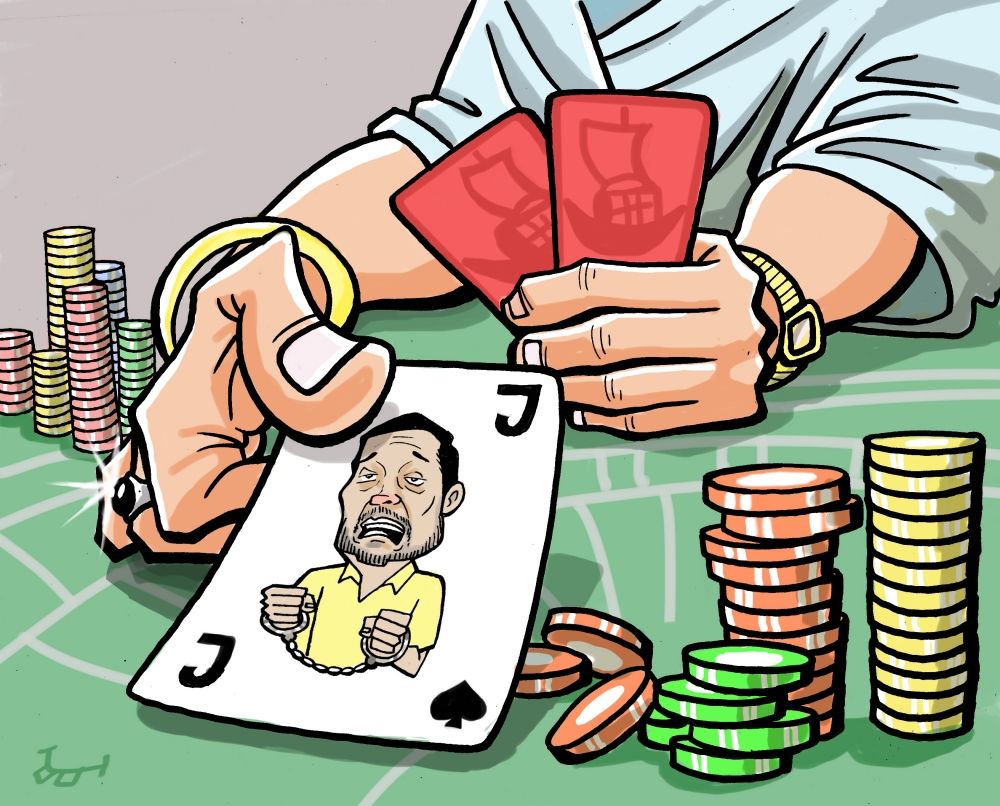Putting her own house in order
Can Sheikh Hasina carry out her promises on corruption?

The recent anti-corruption drive in Bangladesh against a few ruling party affiliated student and youth leaders, contractors and casino kingpins is in some ways unprecedented and has raised wide public interest and expectations. The large financial booties gained from illegal casinos, public procurement and other instances of abuse of politically linked power are scandalous, though to many not surprising at all. It was inevitable that corruption would be allowed to become institutionalised.
What has so far been exposed is just a tip of the iceberg, symptoms of a much deeper and multi-layered cancerous disease. It has been caused by a long-nourished feature of Bangladesh’s political culture where the possession of power is simply a mandate to abuse it for private gain and personal enrichment. This mandate is treated as normal, unrestricted and all-embracing. Over the years, it has been blessed, protected and promoted by the beneficiaries amongst power-holders in politics, business, the civil service, and law enforcement.
Against this backdrop, the prime minister, who is both the head of the government and leader of the ruling party, made three extremely meaningful pledges: that there would be zero tolerance against corruption; that nobody would be spared; and that the Awami League, as the ruling party, must cleanse its own house first. What has happened so far may be broadly viewed consistent with this framework. The main challenge, however, lies in carrying these forward without fear or favour. The extent to which it will be truly implemented depends on the capacity and commitment of those who are entrusted and authorised to carry this out, many of whom are in fact amongst the beneficiaries, promoters and protectors of the institutional structure of corruption.
The drive started on September 14th 2019 with the removal of two leaders of the ruling party’s student front, allegedly for demanding slices of bribes originally given to the organisation’s Jahangirnagar University unit, supposedly as Eid gifts, in a transaction which reportedly took place in the official residence of the vice-chancellor of the university. What remains unanswered is whether the removal of the leaders is enough or whether they, along with all the others within in the supply chain of the allegedly corrupt deal, should be held to account, especially when these student leaders are elected not by students but by the leaders of their parent political parties.
Independent investigation of the transaction, as well as of other reported irregularities in connection with some development projects of the university, have been the main demand of the general students and a section of teachers who organised a series of strikes. Instead of responding to the call for accountability, the university authority closed down the university and also subjected the striking students to various forms of intimidation including harassment by security agencies, a standard means of suppressing dissent.
It surely was no surprise to the police that the casino business flourished in Dhaka. It was no petty crime that escaped the attention of law enforcement authorities. It happened in front of the eyes of the law enforcement agencies, administration, customs, immigration and port authorities, political leaders and public representatives of various levels. The key question is whether the multiplicity of such stakeholders in this business of corruption will really be brought to justice consistent with the prime minister’s pledges of zero tolerance and sparing nobody.
An apparent target of the recent drive is the collusive corruption in public procurement. However, corrupt individuals can only monopolise public procurement if they have the opportunity to collude with relevant officials and influential politicians and this raises the question of how such proverbial political godfathers can be held to account.
Another dimension of the abuse of politically linked power is the criminalisation of student politics, ruthlessly manifested by the killing of the BUET student Abrar Fahad. This exposed the brute face of intolerance to the constitutionally guaranteed exercise of freedom of expression. In response, the BUET authorities banned student politics which could be seen as chopping off the head simply to medicate a headache. The right of non-partisan general students to free speech was the easy scapegoat. Moreover, it seems strange to restrict students’ free expression, when it was Abrar’s attempt to express his independent views which resulted in him paying with his life. There is no indication yet that the proper lesson has been learnt, which is to delink student and youth politics from the deep-rooted criminalisation in mainstream political space.
The delivery of the prime minister’s pledge to put her own house in order needs a paradigm shift in political norms and practices and would require for the political parties to be retransformed into genuine political institutions. This is too disruptive to be realistic for today’s political parties. It would also require similar changes in many other institutions of the state, which have been rendered nearly dysfunctional. Therefore, it will be no surprise if the much-hyped anti-corruption drive remains limited to only a few selected bad apples while the deeper and structural problems will remain.●
Iftekharuzzaman is the executive director of Transparency International Bangladesh.